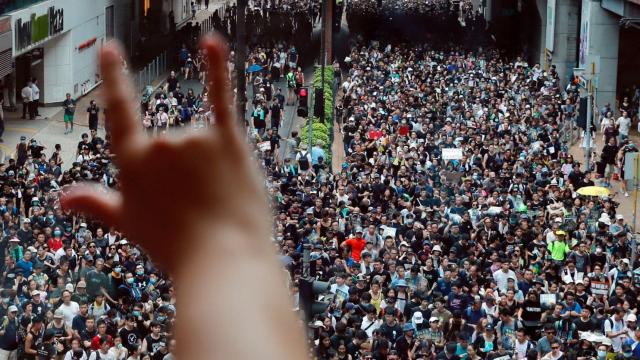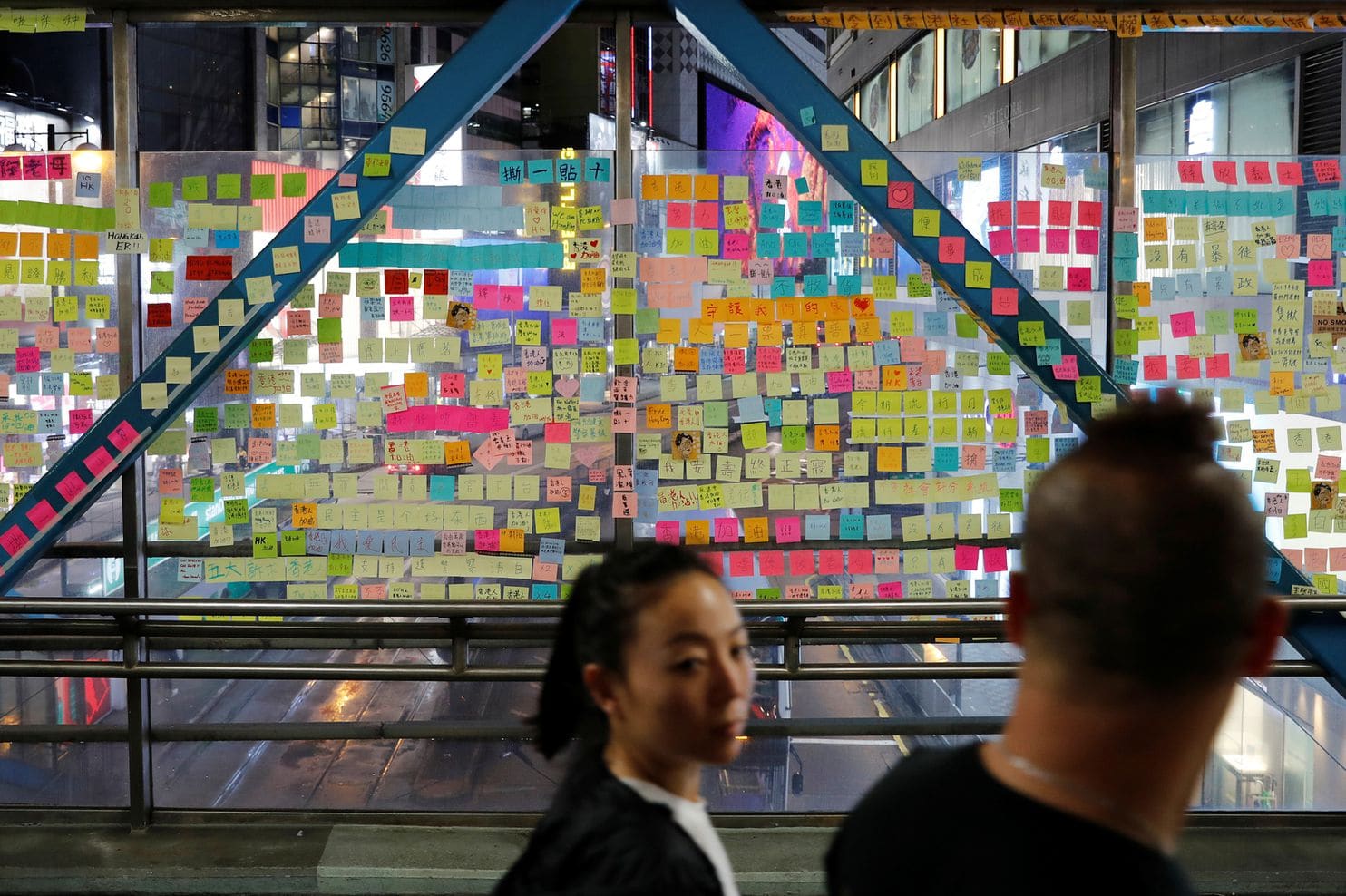
Demonstrators protesting an extradition bill march in the Sha Tin area of Hong Kong on Sunday. (Tyrone Siu/Reuters)
Protests in Hong Kong expanded in terms of geographical reach and demands Sunday as thousands of people marched in the streets of a populous suburb, calling not just for the complete withdrawal of a bill allowing extradition to China but also the right to vote for their leaders.
As the march wound down, violent clashes broke out between riot police and a small group of protesters. After using pepper spray and batons to push people back, officers forcibly cleared protesters from a suburban shopping mall in an escalation of chaotic scenes that have become commonplace here. Videos showed officers being attacked with metal sticks and other makeshift weapons by a small mob.
Pro-democracy groups reported that several of their members had been arrested, and live video feeds showed officers subduing protesters. Police did not immediately provide details on arrests.
Organizers rallied demonstrators around calls for universal suffrage for Hong Kong, the latest sign of how the movement has grown to include broader demands — all squarely pointed at Beijing’s influence.
“We want total democracy in Hong Kong,” said Kelvin Wong, who declined to give his age. “We need to be autonomous.”
Sunday’s protest was held in Sha Tin, an area populated in the 1970s as the city expanded. Protesters have deliberately moved into neighborhoods beyond central Hong Kong in an effort to reach the wider population. Sha Tin is in the New Territories, a hilly region between Hong Kong’s Victoria Harbor and mainland China, and is popular with mainland Chinese visitors.
“We used to not really protest in residential areas. Most of us think it’s not good to disturb the neighborhood,” said Jacky Chan, 26, who says he has been involved in most of the protests over the past five weeks. “But it is significant that these residential neighborhoods will allow us to do these events here.”
He added that the protests could help reach locals who might otherwise consume only pro-government news.
Some residents unfurled banners of support from their homes Sunday and threw umbrellas and other supplies to the crowd. The protesters use umbrellas as shields against riot police.
The citizens of the semiautonomous territory of Hong Kong do not vote directly for their leaders, who are instead chosen by a 1,200-member committee out of a pool of candidates screened by Beijing.
Protests in 2014 known as the Umbrella Movement represented a landmark moment in the city, shuttering parts of downtown over a demand for universal suffrage. Those protests were ultimately quashed and their leaders imprisoned.
“The extradition law has reminded us that what we really need above anything else is democracy,” Chan said. He and others want a government that is more accountable to the people of the city than to authorities in Beijing and is able to address their concerns about soaring living costs.
A separate protest was held Saturday in Sheung Shui, close to Hong Kong’s border with the mainland city of Shenzhen, against “parallel traders” from China who buy baby formula and other necessities tax-free and then sell them to day-trippers from the mainland at marked-up prices.
Local residents say the traders have pushed out mom-and-pop shops and depleted supplies of groceries and other goods.
During Saturday’s demonstration, ambulances were seen taking a few injured protesters from the site. A number of police officers were also injured, according to videos and local reports.
“Some protesters deliberately blocked the roads after the procession, hurled iron poles, scattered an unknown powder, charged police cordon lines and assaulted police officers,” the Hong Kong government said in a statement after the rally. “The government strongly condemns the violent acts committed.”
The government statement also spelled out measures Hong Kong has taken to “mitigate the nuisance” caused by the parallel traders.
The traders typically take advantage of multiple-entry visas into Hong Kong and sometimes hire illegal workers.
Hong Kong’s leader, Carrie Lam, last week described the extradition plan as “dead” and stressed that the Hong Kong legislature would be unable to advance it after the groundswell of dissent. But she has repeatedly declined to fully withdraw the bill, which in Hong Kong requires a specific legislative procedure rather than just a statement.
The weekend demonstrations were the latest indication of a sustained wave of dissent here that has grown to include demands unlikely to be met by Beijing authorities. Many in Hong Kong say that their leader is illegitimate. Half a dozen more protests are planned for the coming week, including a march led by the elderly.
All across Hong Kong, memorial walls — known as “Lennon Walls” for a memorial in Prague filled with messages supporting global causes — have cropped up. They were first used as a protest tool during the 2014 Umbrella Movement. Colorful sticky notes bearing inspirational messages now obscure walls at subway stations and overpasses.
“We have come back even stronger” since 2014, Wong said.
Originally published on the Washington Post
















